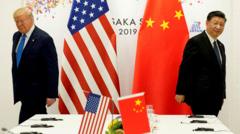Hungary's decision to withdraw from the International Criminal Court has sent shockwaves through international law circles, especially as it coincides with Israeli Prime Minister Benjamin Netanyahu’s visit amidst an ICC arrest warrant against him.
Hungary's Controversial Exit from the ICC Amid Netanyahu's State Visit

Hungary's Controversial Exit from the ICC Amid Netanyahu's State Visit
Hungary's withdrawal from the ICC coincides with Netanyahu's visit, raising international eyebrows.
Hungary's government has officially announced its withdrawal from the International Criminal Court (ICC), a surprising development that coincided with Israeli Prime Minister Benjamin Netanyahu's state visit to the country. The confirmation came from a senior official in Prime Minister Viktor Orban's cabinet just hours after Netanyahu arrived, making his first European visit since the ICC issued an arrest warrant for him last November. This warrant, which indicates "reasonable grounds" for Netanyahu's criminal responsibility for alleged war crimes during the ongoing Israel-Hamas conflict, has been denounced by Netanyahu as an "antisemitic" attack on Israel.
As a founding member of the ICC among its 125 member nations, Hungary's withdrawal marks it as the first European Union country to exit the organization. During a joint press conference with Netanyahu, Orban referred to the ICC as a "political court," arguing that the arrest warrant issued against the Israeli leader is indicative of this biased politicization. In contrast, Netanyahu applauded Hungary's departure, suggesting that it reflects a broader resistance to an organization he views as corrupt.
This exit highlights Hungary's ongoing foreign policy, which has aligned closely with Israel and exhibits skepticism towards international entities that infringe on national sovereignty. The decision, while significant symbolically, is unlikely to impact the functioning of the ICC itself, which has seen varying challenges but maintains international backing. However, Hungary's stance could inspire other nations to reconsider their commitments to the ICC, especially if political alliances shift.
The USA, Russia, China, and North Korea have all opted out of ICC membership, and while Israel itself is not a party to the treaty, the court has asserted jurisdiction over certain territories due to Palestinian membership. Following Hungary’s withdrawal, it is required to formally notify the UN Secretary General for a process that will take effect a year later, in compliance with Article 127 of the Rome Statute.
An ICC spokesperson remarked that Hungary remains obligated to cooperate with the court despite its withdrawal, and the court has routinely maintained its standard procedures regarding arrest warrants, including for Netanyahu. European nations react differently to the ICC warrant; while some affirm they would arrest him if he were to enter their borders, others like Germany have indicated they would not, though they also underscore the necessity of accountability in international law.
Netanyahu's visit arrives as Israel pursues a contentious military strategy in Gaza, escalating its offensive amid severe accusations of human rights violations. This latest development reinforces the ongoing tensions surrounding the Israel-Hamas conflict, which has resulted in catastrophic civilian casualties in Gaza.
As the international community watches closely, the implications of Hungary's exit and the broader ramifications for the ICC and global justice remain to be seen.






















